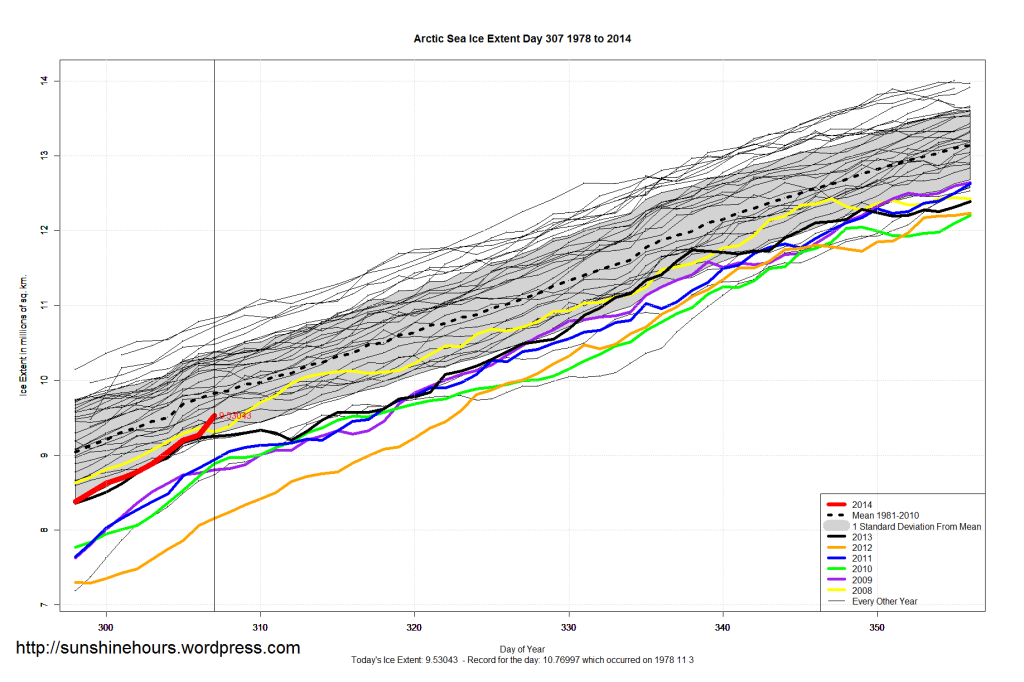Climate Depot’s Marc Morano: ‘The GOP sweep is a victory for science. Obama’s EPA & UN agenda will now face serious setbacks’
…Warmists lament: ‘The biggest loser in this election is the climate’
…White House: GOP Senate won’t stop Obama on climate
…Steyer’s money falls flat!? Republicans take Senate majority
…GOP Wins Control of Senate: Inhofe blasts ‘extreme’ IPCC climate report
…Antarctic Sea Ice Extent Second Highest On Record In October
Antarctic sea ice extent just slipped below last year’s record level, but was still the 2nd highest October extent in the modern satellite record. At the end of the month it measured 18.208 million sq km, 768,000 sq km above the 1981-2010 average.…
Arctic Sea Ice Expands To Highest Level Since 2001
Arctic Sea Ice Day 307 – Highest Since 2001
http://sunshinehours.wordpress.com/2014/11/04/arctic-sea-ice-day-307-highest-since-2001
Day 307 Arctic Sea Ice = 9.53043 million sq km. The last time it was higher on day 307 was 2001 when it was 9.79070 million sq km
 …
…
New Claim: ‘Climate Change Threatens NASA Space Operations’ – AGW ‘could pose a risk to its operations and missions’
NASA identifies a number of potential risks, including damaged infrastructure, power failures that threaten communications systems, delayed launches, employee health and safety concerns, contamination and even threats to endangered species. It says it could expect the loss of land essential to launch operations, experience extensive downtime when its systems are disrupted, and asks “Given the already degraded condition of much of NASA’s infrastructure portfolio, how will NASA find the money to conduct necessary adaptations, repair failing infrastructure, and maintain mission tempo?”…
UN IPCC Scientists Emphasize Immorality Of Inaction By Focusing On ‘Irreversible Impacts’
IPCC Scientists Emphasize Immorality Of Inaction By Focusing On ‘Irreversible Impacts’
http://thinkprogress.org/climate/2014/11/04/3587527/ipcc-irreversible-impacts/
CREDIT: Shutterstock What is the biggest change in the new climate report by the world’s top scientists and governments compared to the one they released back in 2007? It can be summed up in one word: “Irreversible.” In the 2007 assessment of climate science by the U.N. Intergovernmental Panel on Climate Change (IPCC), that word appeared only 4 times in the final, full “synthesis” report. Irreversibility only received 2 mentions and minimal discussion in the Summary for Policymakers (SPM). Seven years later, the word appears 31 times in the full synthesis report of the IPCC’s fifth assessment. The SPM mentions “irreversible” 14 times and has extended discussions of exactly what it means and why it matters. Certainly the fact that we are on track to harm billions of people who contributed little or nothing to their harsh fate makes climate inaction a grave “wrong.” But what makes our current inaction uniquely immoral in the history of homo sapiens is that the large-scale harm is irreparable on any timescale that matters — and, of course, that we could avoid the worst of the irreparable harms at an astonishingly low net cost. What do the world’s leading scientists mean by “irreversible impacts”? Warming will continue beyond 2100 under all RCP scenarios except RCP2.6. Surface temperatures will remain approximately constant at elevated levels for many centuries after a complete cessation of net anthropogenic CO2 emissions. A large fraction of anthropogenic climate change resulting from CO2 emissions is irreversible on a multi-century to millennial time scale, except in the case of a large net removal of CO2 from the atmosphere over a sustained period…. It is virtually certain that global mean sea-level rise will continue for many centuries beyond 2100, with the amount of rise dependent on future emissions. Translation: Impacts will be even worse than described in this report after 2100 in every case but the one where we sharply cut CO2 emissions starting now (to stabilize at 2°C total warming). And as high as total warming ultimately gets, that’s roughly as high as temperatures will stay for hundreds of years after we bring total net human-caused carbon pollution emissions to zero. The “case of a large net removal of CO2 from the atmosphere over a sustained period” means a time far beyond when humanity has merely eliminated total net human-caused …
